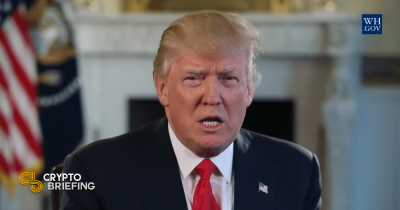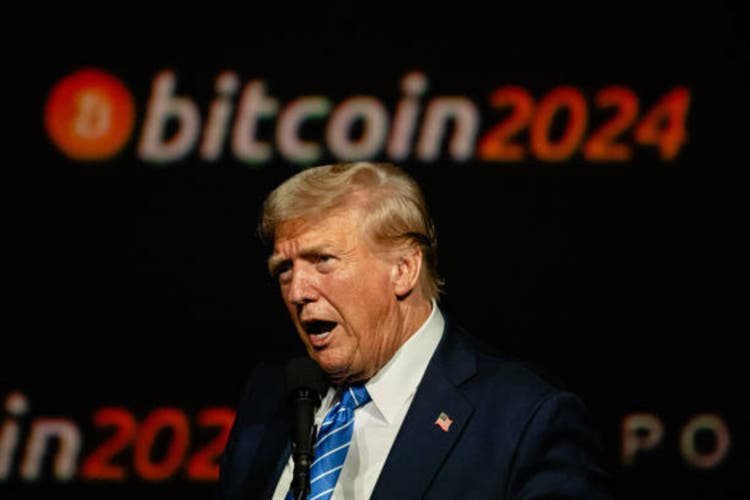The Potential for a USA Digital Asset Stockpile: Exploring the Future of Cryptocurrency Reserves
Jan 23, 2025Explore the potential of a USA digital asset stockpile, examining Trump's evolving stance, legislative initiatives, benefits, challenges, and the role of a crypto working group.
The Potential for a USA Digital Asset Stockpile: Exploring the Future of Cryptocurrency Reserves
The question of whether the USA digital asset stockpile? will become a reality is a complex one, fraught with political, economic, and technological considerations. With Donald Trump's renewed focus on cryptocurrency and the introduction of various legislative proposals, the possibility of the United States establishing a strategic reserve of digital assets is gaining traction. This article synthesizes available information to explore the potential implications, challenges, and ongoing developments surrounding this concept.
Trump's Evolving Stance on Cryptocurrency and Digital Asset Stockpile
Donald Trump's views on cryptocurrency have undergone a notable transformation. Initially dismissive, even labeling Bitcoin a "scam," he has since embraced the digital asset landscape, pledging to make the United States the “crypto capital of the planet.” This shift in attitude has fueled speculation and optimism regarding the future of cryptocurrency regulation and adoption in the US.
 Credit: static.cryptobriefing.com
Credit: static.cryptobriefing.com
Trump has explicitly stated his intention to explore a USA digital asset stockpile?, similar to the country's strategic oil reserve. This idea involves the government acquiring and holding a significant amount of Bitcoin and potentially other cryptocurrencies as a strategic national asset. The motivation behind this proposal is to maintain a competitive edge against other nations, particularly China, which are also exploring digital asset strategies.
Executive Orders and Crypto Working Groups
Reports indicate that the Trump administration is considering issuing executive orders focused on cryptocurrency, potentially solidifying its commitment to a USA digital asset stockpile?. One such order, signed on January 23, 2025, establishes a crypto working group to advise the administration on industry-related policies.
 Credit: static.seekingalpha.com
Credit: static.seekingalpha.com
This working group's role will be to formulate strategies for the USA digital asset stockpile?, address regulatory challenges, and promote innovation within the cryptocurrency sector. Such measures signal a proactive approach towards integrating digital assets into the nation's financial framework.
Legislative Initiatives: The BITCOIN Act and State-Level Efforts
Beyond executive actions, legislative initiatives are also playing a crucial role in shaping the future of a USA digital asset stockpile?. Senator Cynthia Lummis introduced the BITCOIN Act, proposing that the US Treasury acquire one million Bitcoin over five years. This act aims to position Bitcoin as a strategic asset to hedge against inflation, reduce national debt, and strengthen the US’s financial leadership globally.
State-Level Strategic Bitcoin Reserve Acts
Several states are also exploring the possibility of establishing their own Bitcoin reserves. Oklahoma, for example, has introduced the Strategic Bitcoin Reserve Act, which would permit the State Treasurer to invest public funds in crypto assets. This is part of a broader push to build strategic crypto reserves in various US states, including Texas, Pennsylvania, and Ohio. These state-level efforts reflect a growing interest in leveraging digital assets for economic and financial stability.
Potential Benefits of a USA Digital Asset Stockpile
Proponents of a USA digital asset stockpile? argue that it could bring several benefits.
- Economic Competitiveness: By embracing cryptocurrency, the US can maintain its position as a global leader in financial innovation and technology.
- Inflation Hedge: Bitcoin, with its limited supply, is seen as a potential hedge against inflation and the devaluation of the US dollar.
- Debt Reduction: Some propose using Bitcoin reserves to retire outstanding federal debt, although this remains a controversial idea.
The $15 Trillion Market Cap Prediction
Perianne Boring, the founder of crypto trade association The Digital Chamber, suggests that the stock-to-flow model predicts bitcoin could reach over $800,000 by the end of next year if Trump's proposals are enacted. This would give bitcoin a market capitalization of around $15 trillion, up from $2 trillion currently.
Challenges and Concerns
Despite the potential benefits, the concept of a USA digital asset stockpile? also faces significant challenges and concerns.
- Volatility: Cryptocurrencies are known for their extreme price volatility, making them a risky asset for government reserves.
- Regulatory Uncertainty: The regulatory landscape for cryptocurrency is still evolving, which creates uncertainty and potential risks.
- Energy Consumption: Bitcoin mining, required to maintain the blockchain, consumes a significant amount of electricity, raising environmental concerns.
- Market Manipulation: The cryptocurrency market is susceptible to manipulation, particularly by large holders (whales), which could undermine the stability of a government reserve.
Is it Really a Strategic Reserve?
Some experts argue that a Bitcoin reserve is not a strategic reserve at all, as Bitcoin has no utility. They suggest that Bitcoin is used only for speculation and that its disappearance would have no real impact on the economy. These critics view a USA digital asset stockpile? as more of a "stash," benefiting crypto whales more than taxpayers.
The Role of a Crypto Working Group
The establishment of a crypto working group is a significant step towards addressing the challenges and concerns surrounding digital assets. This group can provide expert advice on regulatory frameworks, risk management strategies, and technological considerations. By fostering collaboration between government agencies, industry experts, and stakeholders, the working group can help ensure that any USA digital asset stockpile? is implemented responsibly and effectively.
The Influence of Political Factors
The political landscape significantly influences the prospects of a USA digital asset stockpile?. Trump's pro-crypto stance has been a major catalyst, but future administrations could take a different approach. Legislation, such as the BITCOIN Act, offers a more stable foundation for a reserve, but it requires congressional approval, which can be a lengthy and complex process.
Dark Money and Fossil Fuel Ties
Concerns have been raised about the connections between pro-Bitcoin advocacy groups and fossil fuel interests. Groups like the Satoshi Action Fund, which advocates for Bitcoin reserves, have ties to the Koch Network and the Heritage Foundation, raising questions about the motivations behind the push for a USA digital asset stockpile?.
Alternative Coins and Potential for US-Based Digital Asset Stockpile?
While Bitcoin has been the primary focus of the strategic reserve discussions, Trump has indicated that he is open to the idea of establishing a reserve with US-based coins such as Solana (SOL), XRP, and USD Coin (USDC).

Credit: static.cryptobriefing.com
This approach focuses on digital assets that are developed and operated within the United States, potentially bolstering domestic innovation and financial independence. However, it also raises questions about the potential impact on Bitcoin's market dominance and the overall decentralization of the cryptocurrency ecosystem.
Conclusion: A Future with Digital Asset Reserves?
Whether the USA digital asset stockpile? becomes a reality remains to be seen. The political will, regulatory framework, and technological advancements will all play a crucial role in determining the future of cryptocurrency reserves in the United States. As discussions continue and legislative proposals move forward, the potential benefits and challenges of incorporating digital assets into the nation's financial strategy will need to be carefully weighed.
SEC Accounting Bulletins on Digital Assets: SAB 121 and SAB 122
Explore the complexities of SEC's Staff Accounting Bulletins 121 and 122, their impact on crypto custody, and the pushback from the financial industry and Congress. Learn about the ongoing debate on digital asset regulation.
Published Jan 23, 2025
Understanding the Collectibles Landscape: Baseball Cards, Stamp Paper, and the Rise of Trump Coin
Explore the world of collectibles, from baseball cards and stamp paper to the digital Trump Coin. Compare market dynamics, investment potential, and unique characteristics.
Published Jan 23, 2025
Fed vs. Market vs. Trump: The Battle Over Interest Rates
Explore the complex interplay between the Federal Reserve, financial markets, and political influence, particularly Donald Trump's, in shaping interest rates and their impact on the economy.
Published Jan 23, 2025